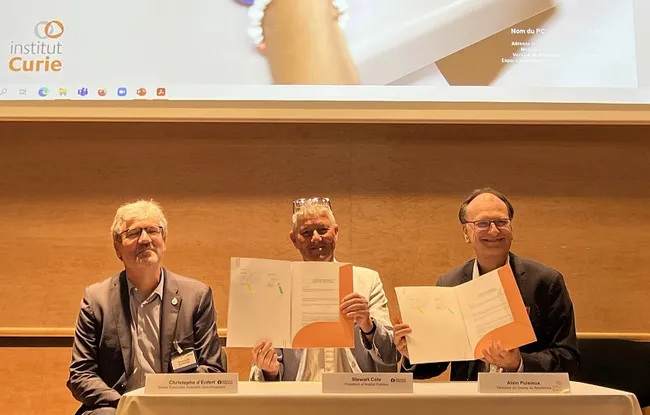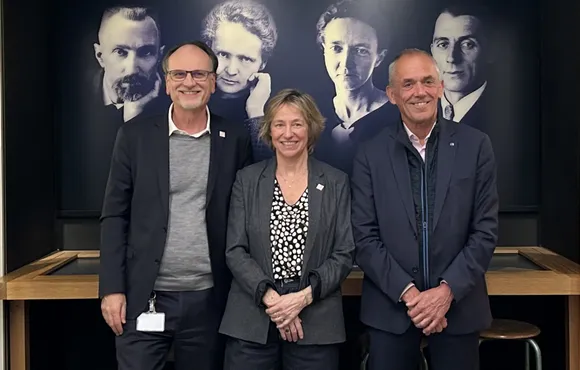- Home >
- Institut Curie News >
- Institut Curie and Institut Pasteur have signed a new strategic agreement that holds great potential for French research
Institut Curie and Institut Pasteur are committing to an ambitious new strategy of collaborative research. An agreement was signed on June 22, 2022 by Prof. Thierry Philip, Chairman of the Institut Curie's Executive Board, and Prof. Stewart Cole, Executive Director of the Institut Pasteur. Its goal? To develop knowledge in cancer cell biology, immunology and human genetics, including through transversal approaches in biophysics and chemistry.
Increased cooperation between the two renowned institutions, Institut Curie and Institut Pasteur, is a major opportunity for national and international research. Linked by a common history spanning more than a hundred years, these two institutions have contributed to improving the state of knowledge in biology, immunology, human genetics and oncology, in the interests of human health, through outstanding research.
Prof. Thierry Philip, Chairman of the Institut Curie's Executive Board: “I am delighted to see that our top priorities are to share and work together, and to show and tell others what we are doing. Scientific cooperation will generate future innovations. The role of the scientist, far from being an isolated scientist in his laboratory, is also that of an entrepreneur working in a particularly competitive system.”
Prof. Stewart Cole, Executive Director of Institut Pasteur: "It is very exciting to see our two institutions working even more closely together with greater variety and intensity than ever before. This agreement underlines the solidarity between private foundations in their fight for human health. We are committed to creating new and positive synergies across all levels, from basic research to innovation to public health."
"In addition to reinforcing scientific synergies, which will be considerable, it will also be rewarding in human terms, since staff exchanges and mobility between entities (research laboratories and central facilities) will also be promoted," added Prof. Christophe d'Enfert, Scientific Deputy General Director of the Institut Pasteur.
"Given that research is increasingly financed by major tenders, particularly at the European level, it is crucial that we combine our forces to meet these needs. These structuring collaborations will benefit future innovation in the fight against cancer. We will bring together the strength, intelligence and excellence of the research teams of the Curie and Pasteur institutes. This bodes well for the performance of national and international research," said Professor Alain Puisieux, Director of the Institut Curie Research Center.
This agreement also aims to welcome doctoral and postdoctoral students to improve the impact of research and encourage new shared teaching activities.
As a co-founder of the Institut Curie in 1909, along with the Rothschild family and Marie Curie, the Institut Pasteur is a founding member of the Institut Curie's Supervisory Board. The mutual attachment and respect between the two research centers has endured ever since, true to its founders Louis Pasteur and Marie Curie.
The Institut Pasteur and the Institut Curie, both private non-profit foundations recognized as being of public utility, are united by a long common history, but also by numerous collaborations in the scientific field and in their common fight against human suffering.
|
4 key points of the Institut Curie-Institut Pasteur agreement
|



